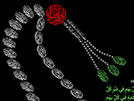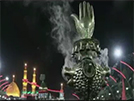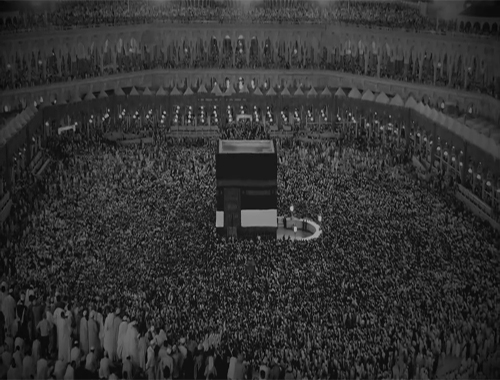Detailed Answer
- Details
- Hits: 2186
Detailed Answer
The answer to this question is on one hand dependent on clarifying the underlying logic of occultation and the concept of intidhar—awaiting the reemergence of the final Imam. On the other hand, it is also dependent on addressing the question of whether there are advantages to the presence of Imam al-Mahdi (ع) while in occultation. But before delving into the logic and benefits of intidhar, we must point out that the [real underlying] cause of occultation is one of the Divine secrets to which we have no access.[265] Nevertheless, with recourse to hadith and reason we can decipher some aspects of the occultation. These aspects can be presented in two groups: 1. those that relate to Imam Mahdi (ع), and 2. those that pertain to other issues.
The first group are as follows:
a. It has been recorded in the hadith corpus that the Imam went into occultation so that he would not be burdened by anyone’s allegiance.[266]
b. In some cases, the reason provided for the occultation is safety from the danger of murder.
c. It has been destined that the Imam should transform the world, carry out an all-encompassing reformation, uprooting all civilizations that are founded on power, wealth, and deception, after which he would build a new civilization based on Divine values. Such would not be possible without an abundant amount of knowledge and experience. This is achievable only through witnessing the ups and downs of bygone civilizations. This in turn necessitates a prolonged life, hence his occultation.
The second group are as follows:
a. Putting the servant of Allah (awj) to test is among the issues mentioned regarding the logic of occultation. Imam Musa ibn Ja’far al-Kadhim (ع) says, “When the fifth son of the progeny of the Seventh Imam goes into occultation, be aware of your faith. Be cautious that no one should convince you to abandon your faith. O my son, the occultation of the Possessor of Authority (sahib al-amr) is inevitable and consequently some believers will abandon their faith. Allah will test His servants by means of the occultation.”[267]
b. The expectation for the faraj (literally “relief”, namely the reemergence of the Twelfth Imam) is a factor conducive to self-building. This anticipation is meaningful only in the context of the occultation. Without the occultation, expectation would be meaningless.
Awaiting the rule of Truth is in essence composed of two elements, one negative and one positive: being discontent with the status quo and the hope and desire for a better situation.
If these two elements penetrate into the inner of the human spirit, they bring about two results: the abandonment of any type of cooperation and compromise with the agents of oppression and corruption on the one hand, and the physical and spiritual preparation for the formation of the unifying and universal government on the other hand.
These two elements propel the human being into motion, awareness, and awakening. It is for this reason that awaiting the Relief has been considered a form of worship[268] and those who await the Relief have been described analogously as those gathered in Imam al-Mahdi’s tent, unified under his banner.
Looking forward to a revolution in which sinners and oppressors are not involved stimulates the believer to embark on self-building such that he would not be of those groups.
Juxtaposing this reality with the ahadith that explain that in his occultation Imam al-Zaman (ع) constantly supervises the state of his followers (reviewing their performance on a weekly basis[269]), it becomes apparent that belief in a living Imam wields a much stronger influence on the spiritual training of the believers than belief in an Imam born in some future time and who would be responsible for forming the universal and unifying government.
c. In addition to stimulating personal self-building, awaiting the reemergence of the Imam is also a potent factor in generating social cooperation, for the program that the believers are anticipating is not a personal one, and thus the faithful believer also endeavours to reform the state of others.
d. The faithful believers do not loose hope in the face of the proliferation of corruption, for they view the goal ahead of them and so avoid being implicated in the corruption that surrounds them. Although remaining hopeful and avoiding corruption is also possible if Imam al-Zaman (ع) were to be born in the designated time of the age of his reemergence, nevertheless it is obvious that believing in a living Imam broadens and perpetuates these two elements (i.e., remaining hopeful and avoiding corruption).
The Blessings of the Presence of Imam al-Mahdi (ع) during the Period of Occultation
1. Inspiriting Hope
The belief in a living Imam who might reappear at any time is similar to the presence of the leader of an army in the battlefield, which is heart warming and animates the troops with the hope of victory.
2. Stimulating Spiritual Improvement and Self-building
As was mentioned earlier, awareness of the Imam’s (ع) monitoring the performance of his followers on a weekly basis can have a beneficial influence on the believers. For, the Qur`anic verses (Such as:
“And say, “Go on working: Allah will see your conduct, and His Apostle and the faithful [as well].”[270]
and the numerous ahadith[271] narrated regarding the presentation of the performance of the virtuous and the debauched and sinners on a daily basis, or every Monday, or Thursday—depending on the narration—to the dignified Prophet of Islam (ص) and the infallible Imams (ع) clearly demonstrate the necessity of examination of one’s conduct and of self-vigilance. The faithful see themselves in the presence of the honourable Imam and so do not dare to make any mistake lest they should upset his holiness. They struggle ever more vigorously in the way of progress and self-preparation in an attempt to draw ever closer to him.
3. Safeguarding the Divine Religion
The Commander of the Faithful, Imam ‘Ali b. Abi Talib (ع), elucidates in an illuminating saying the necessity of the presence of Divine leaders in all eons and times: “Yes, the earth is never empty of one who stands up with Divine Proof. He might be apparent or hidden. But he must be present lest the Divine signs should perish and be forgotten.”[272]
With the passing of time and the incorporation of personal tastes and thoughts into the original religious tenets, various trends have developed that are inclined toward programs that might appear attractive to the masses but are deviations from the authentic religion, setting the stage for the exploitation of celestial concepts by corrupt opportunists, resulting in the alteration of a part of the religious tenets. This is very harmful. This Pure Water which has descended from the Heaven of Revelation gradually looses its purity by being channelled through the minds of various people. The shortsighted alterations of fallible individuals might become so tightly intertwined in the original body of religion that they render any attempt to rediscover the original doctrines very difficult. Considering this reality, should not there be someone to preserve the imperishable doctrines of Islam in their original form for the benefit of future generations? Should future generations be expecting the arrival of a new Celestial Revelation? Without doubt the answer is negative. The gate of revelation has been locked by the Seal of the Prophets. Then how should the original religion be preserved? How should this religion be kept unsullied from the impurities of human alterations and superstitions for the benefit of future generations? Is there any other option but that the line of infallible leaders must continue, whether apparent and visible or hidden and unnoticed?
4. Training a Task Force
Imam al-Zaman’s (ع) occultation benefits the world like the sun hidden behind clouds.[273] The sun blocked by clouds is still beneficial for existents. One of the blessings of Imam al-Zaman’s (ع) presence during the period of occultation is that the elite of the faithful can ascend beyond the clouds, benefiting directly from the rays of the sun of his existence, building themselves through this association and in turn training the larger community of the faithful.
5. Spiritual Influence: Existential Training by Means of Existential Guardianship (al-wilayat al-takwiniyyah)
Imam al-Zaman (ع) is a peerless personage whose penetrating rays of existence influence the hearts of all those ready to receive them, regardless of where they are. It is by this means that the Infallible Imam works to improve the souls of people, although they themselves might not be fully aware of it. The Imam (ع) has authority in an inward fashion on the performance of people. He is aware of all hidden matters related to the crux and truth of the issue of guidance vis-à-vis the souls and performance of people. The good and bad conduct of humans are unveiled before him. It is he who monitors the paths to felicity and wretchedness. Thus, the station of Imamate is concomitant with the Divine authority of guidance. This guidance is not limited to showing the path, which is the duty of all Divine prophets and even believers. Rather, his is the duty to shepherd the servants of God toward the Destined Goal.[274]
6. Purpose of Creation
The world of creation is like a garden. The human beings who are on their way to perfection are its fruitful trees, the deviants its wild and useless weeds. The purpose of watering this garden would be to quench the fruitful trees, not the weeds:
“Indeed my righteous servants shall inherit the earth.”[275]
And if some day all the trees of this garden die and the righteous believers become extinct, there would be no reason to continue watering the garden and the Divine effusion would cease to be. The Infallible Imam (ع) is the Universal Man who is the crown of the party of the righteous and thus the main purpose of creation. It is for this reason that God addresses him so: “If not for you, I would not have created the Spheres [i.e., the universe],”[276] or in another instance it, “If the earth is left without an Imam, it would collapse,”[277] and also, “It is due to the blessing of his existence that all else is nourished, and it is for his existence that the earth and the heaven remain in place.”[278]
7. Being the Intermediary in Effusion
In the disciple of gnosis it is explained that the Truth in Its essential manifestations is absolute unity, while in the realm of multiplicity and Divine activity It manifests Itself through particular individuations. However, the former lacks any hue of multiplicity, while the latter lacks any trace of real unity. Thus, there needs to be a third form of manifestation which could combine the Station of Union with the Station of Separation, serving as the isthmus between the realm of Divine Lordship and the realm of Vassaldom, forming the fusion of Truth and creation; in a word: linking the world of nature and the world of Unity. The Universal Man—the Infallible Imam being the clearest instance—is this link and as such is the intermediary in effusion to the realm of utter multiplicity. Hence he is the manifestation of the lordship of the Truth. On the basis of this exposition, it becomes clear that the following tradition describing the role of the Infallible Imams is not an overstatement: “It is due to them that Allah nourishes His servants; it is due to them that rain descends from the heaven, and it is due to them that the blessings of the earth surface [to benefit the creatures].”[279] And it is in allusion to this reality that Imam Muhammad ibne ‘Ali al-Baqir (ع) says, “We are the Beautiful Divine Names.”[280]
In conclusion, the materialization of the matrix of creation, the effusion of Divine blessings to other-than-Allah, the guidance and training and spiritual perfection of human beings, etc., are all contingent on the existence of a living Imam.
Notes:
[265]Bihar al-Anwar, vol. 52 pg. 91:
Ø¥Ùنَّ Ù„ÙصَاØÙب٠هَذَا الْأَمْر٠غَيْبَةً لاَ بÙدَّ Ù…Ùنْهَا يَرْتَاب٠ÙÙيهَا ÙƒÙلّ٠مÙبْطÙÙ„Ù ÙÙŽÙ‚Ùلْت٠لَه٠وَ Ù„ÙÙ…ÙŽ جÙعÙلْت٠ÙÙدَاكَ قَالَ Ù„Ùأَمْر٠لَمْ ÙŠÙؤْذَنْ لَنَا ÙÙÙŠ كَشْÙÙÙ‡Ù Ù„ÙŽÙƒÙÙ…
[266]Bihar al-Anwar, vol. 51, pg. 152
عَنْ الرÙّضَا عَلَيْه٠السَّلاَم٠أَنَّه٠قَالَ : ÙƒÙŽØ£ÙŽÙ†Ùّيْ بÙالشÙّيْعَة٠عÙنْدَ ÙَقْدÙÙ‡Ùم٠الثَّالÙØ«ÙŽ Ù…Ùنْ ÙˆÙلْدÙيْ يَطْلÙبÙونَ الْمَرْعى Ùَلاَ يَجÙدÙوْنَه٠قÙلْت٠لَه٠: ÙˆÙŽÙ„ÙÙ…ÙŽ Ø°ÙŽÙ„ÙÙƒÙŽ يَا ابْنَ رَسÙوْل٠الله٠؟ قَالَ : لأَنَّ إمَامَهÙمْ يَغÙيْب٠عَنْهÙمْ ÙÙŽÙ‚Ùلْت٠: ÙˆÙŽÙ„ÙÙ…ÙŽ ØŸ قَالَ Ù„Ùئَلاَّ ÙŠÙŽÙƒÙوْنَ ÙÙيْ عÙÙ†ÙÙ‚Ùه٠لاَØَد٠بَيْعَةً إذَا قَامَ بÙالسَّيْÙÙ
[267]Bihar al-Anwar, vol. 51 pg. 113:
Ø¥Ùذَا ÙÙÙ‚Ùدَ الْخَامÙس٠مÙنْ ÙˆÙلْد٠السَّابÙع٠Ùَاللَّهَ اللَّهَ ÙÙÙŠ أَدْيَانÙÙƒÙمْ لاَ ÙŠÙزÙيلÙÙƒÙمْ Ø£ÙŽØَدٌ عَنْهَا يَا بÙنَيَّ Ø¥Ùنَّه٠لاَ بÙدَّ Ù„ÙصَاØÙب٠هَذَا الْأَمْر٠مÙنْ غَيْبَة٠Øَتَّى يَرْجÙعَ عَنْ هَذَا الْأَمْر٠مَنْ كَانَ ÙŠÙŽÙ‚Ùول٠بÙه٠إÙنَّمَا Ù‡ÙÙŠÙŽ Ù…ÙØْنَةٌ Ù…ÙÙ†ÙŽ اللَّه٠عَزَّ ÙˆÙŽ جَلَّ امْتَØÙŽÙ†ÙŽ بÙهَا خَلْقَه.
[268]Bihar al-Anwar, vol. 52, pg. 22:
Ø£ÙŽÙْضَل٠أَعْمَال٠شÙيعَتÙنَا اÙنْتÙظَار٠الْÙَرَجÙ.
[269]al-Kafi, vol.1 pg. 219-220
[270]Surat al-Tawbah (9), Verse 105:
} ÙˆÙŽÙ‚Ùل٠اعْمَلÙوا Ùَسَيَرى اللٌّه٠عَمَلَكÙمْ ÙˆÙŽ رَسÙولÙÙ‡Ù ÙˆÙŽ الْمÙؤْمÙÙ†Ùونَ... {
[271] al-Kafi, vol. 1, pp. 219-220
[272] Al-Kafi, vol. 1, pp. 178-180:
أَللٌّهÙمَّ بَلى لاَتَخْلÙوا الأَرْضَ Ù…Ùنْ قَائÙÙ…Ù Ù„ÙÙلٌّه٠بÙØÙجَّة٠إَمَّا ظَاهÙراً مَشْهÙوراً أَوْخَائÙÙاً مَغْمÙوراً Ù„Ùئَلاَّ تÙبْطÙÙ„ÙŽ ØÙجَج٠اللٌّه ÙˆÙŽ بَيÙّنَاتÙÙ‡Ù.
[273]Bihar al-Anwar, vol. 52, pg. 92
[274]al-Mizan, vol. 1, pp. 275-276
[275]Surat al-Anbiya` (21), Verse 105:
} أَنَّ الأَرْضَ يَرÙØ«Ùهَا عÙبَادÙÙŠÙŽ الصَّالÙØÙونَ... {
[276]Bihar al-Anwar, vol. 15, pg. 28:
لَوْلاَكَ لَمَا خَلَقْت٠الأَÙْلاَكَ.
[277] al-Kafi, vol. 1, pg. 179:
لَوْ بَقÙيَت٠الأَرْض٠بÙغَيْر٠الإÙمَام٠لَسَاخَتْ.
[278]Mafatih al-Jinan, Du’a al-’Adilah:
بÙÙŠÙمْنÙه٠رÙزْق٠الوَرى وَبÙÙˆÙجÙوْدÙه٠تَثْبÙت٠الأَرْض٠وَالسَّمَاءÙ
[279]Bihar al-Anwar, vol. 23 pg. 19:
بÙÙ‡Ùمْ يَرْزÙق٠الله٠عÙبَادَه٠، وَبÙÙ‡Ùمْ ÙŠÙعَمَّّر٠بÙلاَدÙÙ‡Ù ØŒ وَبÙÙ‡Ùمْ يَنْزÙل٠الْقَطَر٠مÙÙ†ÙŽ السَّمَاء٠، وَبÙÙ‡Ùمْ تَخْرÙج٠بَرَكَات٠الأرْضÙ
[280] Al-Kafi, vol. 1, no. 4











